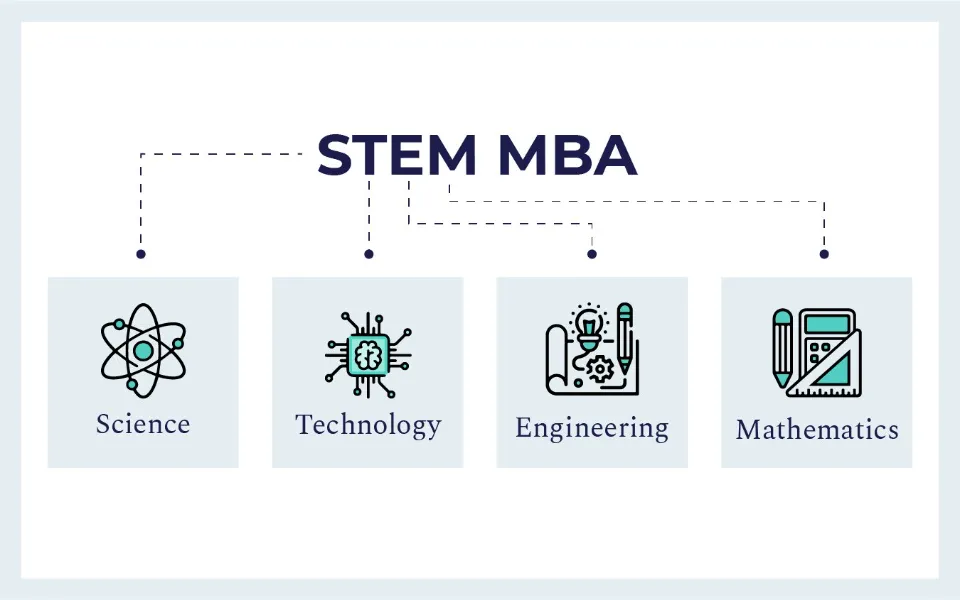If you are pursuing an MBA degree, you may consider a STEM program. But is MBA a STEM degree? Read before you apply for an MBA degree.
As a way for universities to both increase their relevance in a world that is more analytical and tech-driven and to draw in more international students, there has been a recent explosion in STEM (Science, Engineering, Tech, and Mathematics)-focused MBA programs in the United States.
A common question is “Is an MBA a STEM degree?” The STEM field does not typically include business and management programs like MBAs.
This article will examine STEM MBA programs, their benefits, the opportunities STEM graduates receive, and the ideal candidates for these programs.
Is MBA a STEM Degree?
No, a STEM (science, technology, engineering, and math) degree or field is typically not considered to be an MBA (Master of Business Administration).
A graduate degree in business administration (MBA) equips students for a career in business or finance and enables them to enter the workforce above entry level due to their advanced education (and, typically, experience gained from work or internships).
Calculus, trigonometry, and theoretical mathematics are also common STEM subjects, as are biology, physics, chemistry, computer science, information technology, mechanical, chemical, or civil engineering.
Related: What is a Mini MBA?

Accounting is a math-related subject, but it belongs more to the business category because the required mathematics courses only go as far as general college math.
You can look at institutions that offer specialized programs if you want to pursue an MBA with coursework related to STEM fields. With the help of these degrees, business and financial principles and STEM principles will be combined.
Not all schools offer these programs, and some may not let you take courses other than those in business or finance. For details pertaining to your degree program, you should speak with an admissions counselor or your academic advisor.
Benefits and Challenges of STEM Programs
- Knowledge Breadth: Students in an MBA program study their area of interest in addition to basic business principles. By emphasizing technological know-how, data analytics, and innovation management strategies, a STEM MBA program goes a step further in this direction.
- Career Opportunities: Employers value the high-level business skills that an MBA indicates. MBA students gain useful experience, perhaps through capstone projects or internships. Additionally, those pursuing degrees have access to networking opportunities with alumni, partners, and peers in the STEM fields.
- Expertise: STEM designations, which denote superior math and technological skills, may be attached to general MBA programs. An MBA program that focuses on business analytics, finance, supply chain operations, or both, is frequently directly related to STEM programs, helping students to further develop their specialized knowledge.
- Time Investment: Any degree program requires a time commitment. The typical length of an MBA program is one to two years. Students may occasionally work and study part-time. There are some accelerated programs that demand a full-time commitment.
- Cost: Additionally, there is a sizable financial outlay for an MBA program. The annual cost of MBA tuition can vary from $28,000 to $64,000 depending on a number of factors. Spending can also rise due to the need for additional materials and travel.
- Curriculum Depth: Business-minded students may benefit from an MBA program’s breadth of knowledge. But aspiring STEM professionals who want to work directly in technical fields like web development, architecture, or civil engineering might discover that a STEM degree is better suited to their objectives.

What Should You Consider Before Deciding on a STEM MBA Program?
Investigate the professions that are available in the fields that interest you to get a sense of the mix of business and STEM skills that are needed.
Consider What Job Function Fits You Best
Consider your prior experience and the kind of role you want. Are management positions more appealing to you than positions as a strategic analyst? Look into MBA programs that concentrate on preparing students for these particular fields.
Also, think about any career shifts you may want to make. The STEM MBA is the perfect tool to help you transition into more analytical roles if you have a business background or if you have a technical background and want to move into management or business.
Consider Where You Want to Be Located
You might prefer to be situated in a particular area depending on your personal objectives. For instance, if you are interested in software engineering, you might be determined to settle in Silicon Valley.
Research MBA programs and internship/professional opportunities in your top-choice regions once you’ve decided where you want to live so you can get a sense of what your future might hold.
Understand Your Strengths and Gaps
It’s critical that you understand both what you want to build on and where you are lacking in order to select the program that is best for you because your goals almost certainly call for you to develop yourself in a variety of areas.
Even though you might not currently possess the ideal combination of STEM and business expertise for your dream job, the right STEM MBA program can help you develop precisely the areas that you need to focus on the most urgently.
Find out as much as you can about the courses, instructors, and extracurricular activities offered at various programs so you can determine which ones are best for you.
Final Words: Is MBA a STEM Degree?
MBA is not a STEM degree. Only a small number of MBA programs, however, have STEM designations due to their emphasis on business analytics, decision theory, finance, economics, information technology, law, marketing, management, statistics, and strategy.
Business school applicants who envision themselves as team leaders of tech and data-driven teams in fast-paced corporate environments will do well in STEM MBA programs.
The OPT extension at STEM-designated programs is an additional benefit for international candidates who want to work in the United States after graduation. This makes you qualified for three years of employment without company sponsorship.
FAQs
Is Stanford MBA a STEM Degree?
The Stanford Graduate School of Business MBA and MSx Programs are STEM-designated degree programs.
Is NYU MBA a STEM Degree?
NYU Stern’s Andre Koo Tech MBA is a STEM-designated degree program.
Is UCLA MBA a STEM Degree?
UCLA Anderson offers STEM designation across all of its MBA programs, providing significant flexibility to those who are interested in the benefits of this track but also have more specific career interests. STEM-certified degrees from Anderson include the Master of Financial Engineering and the Master of Science in Data Analytics.







